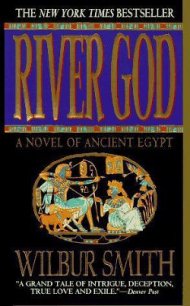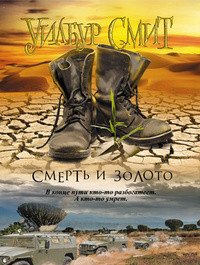Men of Men - Smith Wilbur (книги бесплатно без txt) 📗
"I am called Tanase," she said. "And once I was the Umlimo., There was a low gasp of shock at her mention of that name.
"I was the Umlimo," Tanase repeated. "But then the powers of the spirits were taken from me."
They sighed softly and stirred like dead leaves when a random breeze passes.
"There is another who is now the Umlimo, and lives in the secret place in the hills, for the Umlimo never dies."
There was a little hum of assent.
"Now I am the voice of the Umlimo only. I am the messenger who brings you the word of the Umlimo.
Listen well, my children, for the Umlimo prophesies thus." She paused and now the silence was charged with religious terror.
"When the noon sun goes dark with wings, and the trees are bare of leaves in the springtime, then warriors of Matabele put an edge to your steel."
Tanase paused and the firelight gleamed on the hundreds of eyes that watched her.
"When the cattle lie with their heads twisted to touch their flank and cannot rise, then will be the time to rise up and to strike with the steel."
She spread her arms like a crucifix and cried out: "That is the prophecy. Harken to it, children of Mashobane; Harken to the voice of the Umlimo. For the Matabele will be great once again."
In the dawn the two wanderers, carrying the infant who was named the "Seeker after what has been stolen", went on towards the next village, where the elders came out to greet them.
In the southern springtime of 1896 on the shores of a lake near the southern extremity of the Rift Valley, that mighty geological fault which splits the African Continental Shield like an axe stroke, a bizarre hatching occurred.
The huge egg masses of schistocerca gregaria, the desert locust, that were buried in the loose earth along the border of the lake, released countless multitudes of flightless nymphs. The eggs had been laid by females in the solitary phase of the locust's life cycle; but so vast was the hatching of their progeny that the earth could not contain them, and though they spread out over an area of almost fifty square miles, they were forced to crawl upon one another's backs.
The constant agitation and stimulation of contact with other nymphs wrought a miraculous change in this teeming tide of insects. Their colour turned to a vivid orange and midnight black, unlike their parents" drab brown.
Their metabolic rate surged and they became hyperactive and nervous. Their legs grew longer and stronger, their gregarious instincts more powerful, so that they flowed in a compact body that seemed to be a single monstrous organism. They had entered the gregarious phase of the life cycle, and when at last they moulted fox the last time and their newly-fledged wings had dried, the entire swarm took spontaneously to the air.
In that first baptism of flight, they were spurred by their high body temperature, which was raised further by their muscular activity. They could not stop until the cool of evening, and then they settled in such dense swarms that the branches of the forest snapped under their weight. They fed voraciously all night, and in the morning the rising heat spurred them into flight once more.
They rose in a cloud so dense that the sound of their wings was the drumming roar of hurricane winds. "the trees they left behind were stripped completely of their tender springtime foliage. As they passed overhead, their wings eclipsed the noonday sun, and a deep shadow fell over the land.
They were headed south towards the Zambezi river.
From the Great Sud where the infant Nile river weaves its way through fathomless swamps of floating papyrus, southwards over the wide savannahs of eastern and central Africa, down to the Zambezi and beyond, roamed vast herds of buffalo.
They had never been hunted by the primitive tribes who preferred easier game; only a few Europeans with sophisticated weapons had ventured into these remote lands, and even the lions which followed the herds could not check their natural multiplication.
The grasslands were black with the huge bovine black beasts. Twenty or thirty thousand strong, the herds were so dense that the animals in the rear literally starved, for the pasture was destroyed before they could reach it.
Weakened by their own vast multitudes, they were ripe for the pestilence that came out of the north.
It was the same plague that Moses" God had inflicted on the Pharaoh of Egypt, the rinderpest, the peste bovine, a virus disease which attacks cattle and all other ruminants. The stricken animals were blinded by the discharge of thick mucus from their eyes. It poured in ropes from their gaping jaws and nostrils to contaminate the pastures and infect any other animal that passed over them.
Their emaciated bodies were wracked by spasms of profuse diarrhoea and dysentery. When at last they dropped, the convulsions twisted their heads back upon their tortured necks, so that their noses touched one of their flanks, and they could never rise again.
So swift was the passage of the disease that a herd of ten thousand great homed black beasts was wiped out between dawn and sunset. Their carcasses lay so thickly that they touched each other, and the characteristic fetid odour of the disease mingled with the stench of rotting flesh; for although the vultures gorged, they could not devour one thousandth part of this dreadful harvest of death.
Swiftly, carried by the vultures and the blundering, bellowing herds, the plague swept southwards towards the Zambezi river.
On the banks of that mighty river Tanase stood beside another watch-fire and repeated the prophecy of the Umlimo: "When the noon sun goes dark with wings, and the trees are bare of leaves in the springtime "When the cattle lie with their heads twisted to touch their flank, and cannot rise Thus she cried, and the people of the Matabele listened and took new heart and looked to their steel.
The End




